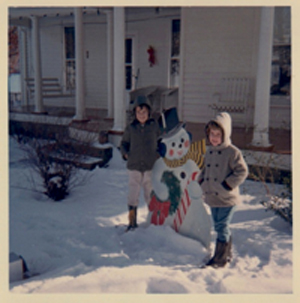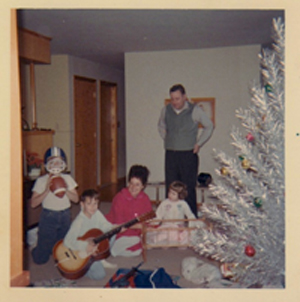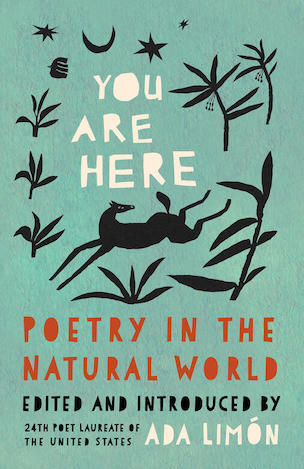Oysters and Pop Tarts
A Chapter 16 writer tells a tale of two Christmases
When I was a child, Christmas at Granny Browning’s house was about tradition, not pleasure. Granny had fixed ideas about how the holiday should be celebrated, and we all followed her lead with no thought of innovation or accommodation. Family custom dictated that fried oysters would be served on Christmas Eve, though I think it’s fair to say that most of the family was lukewarm on oysters. I hated them. Their weird, marine smell and even weirder taste and texture made them nauseating to my small self. But that didn’t matter. Oysters were the proper Christmas Eve repast, so everybody ate them, me included. I choked down those gooey globs without resentment, in perfect resignation to the requirements of the occasion. I think I even felt a certain virtue in it. I was living up to the way a Browning did Christmas.
 Granny’s fruitcakes were another obligatory trial. The essential awfulness of fruitcake is a very tired joke, but trust me: my grandmother’s fruitcakes were extraordinary in their leaden horror. I remember watching her labor over their creation, carefully filling the small loaf pans and peeking at them in the oven as if they were babies in a hospital nursery. Her love, alas, could not save them. Those cakes were mealy, oddly tasteless, and invariably a little burned. Even she admitted they were bad. Their repeated failure must have embarrassed her—she was generally a better-than-competent cook—and yet she went right on making them. And we went right on eating them because that’s what we were supposed to do. Brownings could not have Christmas without homemade fruitcake.
Granny’s fruitcakes were another obligatory trial. The essential awfulness of fruitcake is a very tired joke, but trust me: my grandmother’s fruitcakes were extraordinary in their leaden horror. I remember watching her labor over their creation, carefully filling the small loaf pans and peeking at them in the oven as if they were babies in a hospital nursery. Her love, alas, could not save them. Those cakes were mealy, oddly tasteless, and invariably a little burned. Even she admitted they were bad. Their repeated failure must have embarrassed her—she was generally a better-than-competent cook—and yet she went right on making them. And we went right on eating them because that’s what we were supposed to do. Brownings could not have Christmas without homemade fruitcake.
Not everything about Granny’s never-changing Christmas was a drag. Far from it. Aside from the food, it was as charming as a storybook. There was always a real tree, which had usually been harvested out in the woods by my dad and brothers, and it was adorned with a mismatched collection of antique ornaments. Granny decorated her white frame cottage with the same sapphire-blue lights year after year, and they gave a wondrous glow to the old plywood snowman she always placed in the front yard. (That snowman was like a member of the family. He disappeared somehow after Granny died, and one of my brothers mourns him still.)
Granny’s gift-giving was done on Christmas Eve, once we were finished with the oyster ordeal, and it was always modest—just a little money and a small present for each kid. Mine was most often a piece of little-girl jewelry or a book. I was perfectly happy with my token, and I think my brothers felt the same. To get anything more would have seemed bizarre. Granny liked to sing the chorus of “Up on the House Top,” but Santa Claus and his largesse were never otherwise invoked at her house. Fantasy and excess were not part of her tradition.
 Our dose of fantasy and excess came at home, where the pleasure principle ruled, at least on Christmas, and my parents delivered a blast of late-twentieth-century consumer indulgence to offset Granny’s old-fashioned restraint. At our house the holiday wasn’t centered on ritual; it was about stuff, the more the better. We’d drive back to our house on Christmas Eve and do a perfunctory reading from the Gospel of Luke, and then we kids would trot off to bed knowing that our last holiday duty was done and the real celebration was about to commence.
Our dose of fantasy and excess came at home, where the pleasure principle ruled, at least on Christmas, and my parents delivered a blast of late-twentieth-century consumer indulgence to offset Granny’s old-fashioned restraint. At our house the holiday wasn’t centered on ritual; it was about stuff, the more the better. We’d drive back to our house on Christmas Eve and do a perfunctory reading from the Gospel of Luke, and then we kids would trot off to bed knowing that our last holiday duty was done and the real celebration was about to commence.
Our aluminum tree, bathed in the sweet light of its rotating color wheel, was still bare of presents, but that didn’t worry us at all. Mom would leave out milk and cookies for the fat man, and when we got up, usually well before dawn (none of this waiting around till a reasonable hour), we would discover that he’d brought us a ridiculous and expensive pile of loot. If there was a hot toy of the moment, we got it. Anything we’d been begging for—a ballerina doll, a bike, a telescope, a chemistry set—would be there. We tore into it all like little maniacs, ferocious in our lust to possess.
My brothers were older and probably already hip to Santa Claus, but the illusion was maintained for my benefit. Everyone insisted that Santa was responsible for all the fabulous toys, and the remains of the milk and cookies were there by the tree to prove it was so. Magic had happened. The only prosaic note on Christmas morning was the hovering presence of my exhausted mother, who stood there in her nightgown smiling wearily on our orgy. When the sun came up, she’d go in the kitchen and toast Pop Tarts or bake iced cinnamon rolls from a can—the food of the gods, as far as my brothers and I were concerned. Later on there’d be a standard Christmas meal, but the house was filled with candy, nuts, chips, etc., and we were free to gorge on whatever we wanted.
There was a dark side to our pleasure that was unacknowledged but recognized, I think, by everybody in the household. My parents were very unhappy with each other and would become more so. My father drank, and my mother was almost always sad or quietly angry. My brothers and I were not oblivious to the tension between them. We all had a sense that the overblown Christmas was, at least in part, a way to camouflage a lot of emotional misery. Santa was not the only illusion being maintained. Years later, my mother told me about how my father had gone off drinking late on one of those Christmas Eves with most of our gifts still in the trunk of the car, leaving her at home to wonder what she would tell us when we got up and found next to nothing under the tree. He returned just in time, and we were never the wiser. It was always a bit of a high-wire act, my parents’ magic.
This is where I’m supposed to say that our glitzy Christmas was sorrowful and empty, even crass, and that Granny’s traditions were homely but loving and authentic. The truth is I wish every child on Earth could wallow in fantastic extravagance once a year, and I wish every child could know what it’s like to have a family intact enough to guard traditions. Both our Christmases were wonderful and awful, and both were false in their way—performances, pantomimes of happiness, done out of love. I treasure the memory of all of it. Even the oysters.

Copyright (c) 2014 by Maria Browning. All rights reserved. Maria Browning is a fifth-generation Tennessean who grew up in Erin and Nashville. A graduate of Mount Holyoke College, she has attended the Clothesline School of Writing in Chicago, the Moss Workshop with Richard Bausch at the University of Memphis, and the Sewanee Writers’ Conference. She lives in White Bluff.


